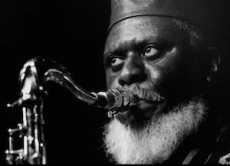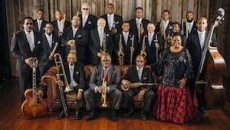
TRIBUTE TO PHAROAH SANDERS
Gary Bartz [Saxophone]
Jean Carn [Vocals]
Norman Connors [Vocals & Drums]
Eddie Baccus Jr. [Saxophone]
The Starship Orchestra
Known for his overblowing, harmonic, and multi-phonic techniques on the saxophone, as well as his use of “sheets of sound”, American jazz musician Pharaoh Sanders played a prominent role in the development of free jazz and spiritual jazz through his work as a member of John Coltrane’s groups in the mid-1960s, and later through his solo work. He released over thirty albums as a leader and collaborated extensively with vocalist Leon Thomas and pianist Alice Coltrane, among many others. Fellow saxophonist Ornette Coleman once described him as “probably the best tenor player in the world”. Most of Sanders’ best-selling work was made in the late 1960s and early 1970s for Impulse Records, including the 30-minute wave-on-wave of free jazz “The Creator Has a Master Plan” from the album Karma.
A native of Baltimore, Gary Bartz has been known to many as a trail blazer in the music business from the moment he started playing with Art Blakey at his father’s jazz club in his hometown to his own music throughout the 57 years as a professional musician. As if his Grammy Award with McCoy Tyner in 2005 (‘Illuminations’) wasn’t enough to carve out a place for Bartz in the jazz genre, he has broken the mold with more than 40 solo albums and over 200 as a guest artist.
Drummer and producer Norman Connors’ work has become a main staple of jazz-fusion, with tracks including “Mother Of The Future” from album “Slew Foot” (1974), “Captain Connors” from album “This Is Your Life” (1977), “You Are My Starship” (1976) album, et al. He has lead jazz recordings with Carlos Garnett, Gary Bartz, Dee Dee Bridgewater, and Herbie Hancock.
Jean Carn began her recording career with her then-husband, pianist Doug Carn, founder of Black Jazz Records and had an astounding five octave voice range. She sang background for artists including the likes of Earth, Wind & Fire and Norman Connors, but in 1977, she debuted solo, playing a crucial role in the golden era of Philly soul.
Streaming: $10.00 + fees
Showtimes ~ Saturday: 7:00 & 9:30pm | Sunday: 5:00 & 7:30pm
More Posts: adventure,club,drums,genius,guitar,jazz,music,orchestra,preserving,saxophone,travel,vocal

THE LEGENDARY COUNT BASIE ORCHESTRA
Music In The Meadow
The Count Basie Orchestra, today directed by Scotty Barnhart, has won every respected jazz poll in the world at least once, won 18 Grammy Awards. In the history of Jazz music, there is only one bandleader that has the distinction of having his orchestra still performing sold out concerts all over the world, with members personally chosen by him, for over 30 years after his passing. Pianist and bandleader William James “Count” Basie was and still is an American institution that personifies the grandeur and excellence of Jazz. The Count Basie Orchestra, today directed by Scotty Barnhart, has won every respected jazz poll in the world at least once, won 18 Grammy Awards, performed for Kings, Queens, and other world Royalty, appeared in several movies, television shows, at every major jazz festival and major concert hall in the world.
Guest Vocalist: Carmen Bradford
More Posts: adventure,festival,genius,jazz,music,orchestra,preserving,travel

VANGUARD JAZZ ORCHESTRA
The Vanguard Jazz Orchestra began its life as the Thad Jones/Mel Lewis Orchestra in 1966.The world-famous Village Vanguard jazz club in New York City booked the newly formed band for three Monday nights that February. Those performances were wildly successful and the engagement was extended indefinitely. The Village Vanguard’s owner, Max Gordon, told Mel Lewis, “We’ll keep it going until it tapers off.” Over half a century and more than 2700 Monday nights later, it still hasn’t. The Vanguard Jazz Orchestra stands apart from all other modern ensembles of its kind and is still as strong and vital as ever.
EVERY MONDAY NIGHT
SAXOPHONES: Dick Oatts (lead alto) Billy Drewes (alto) Rich Perry (tenor) Ralph Lalama (tenor) Gary Smulyan (bari)
TRUMPETS: Nick Marchione (lead trumpet) John Chudoba, Terell Stafford, Scott Wendholt
TROMBONES: Marshall Gilkes (lead trombone) Jason Jackson, Dion Tucker, Douglas Purviance (bass trombone)
RHYTHM SECTION: Adam Birnbaum (piano) David Wong (bass) John Riley (drums)
Two Sets ~ 8:00pm | 10:00pm
More Posts: adventure,album,club,festival,genius,jazz,museum,music,orchestra,preserving,restaurant,travel

Requisites
Perdido ~ The JATP All-Stars | By Eddie Carter
This morning’s column features some of the best musicians in jazz. Jazz At The Philharmonic was a series of concerts organized by Norman Granz. From 1944 to 1949, this revolving ensemble of all-stars made one of the greatest impacts on the public since the heyday of Swing. Perdido (VSP-Verve VSP-16/VSPS-16) is a 1966 reissue highlighting two performances by The JATP All-Stars from September 27, 1947. The song debuted on Norman Granz’s Jazz At The Philharmonic, Volume Eight. The personnel is Howard McGhee on trumpet, Bill Harris on trombone, Illinois Jacquet, Flip Phillips on tenor sax, Hank Jones on piano, Ray Brown on bass, and Jo Jones on drums. My copy used in this report is the 1966 US Mono reissue.
Side One gets underway with Perdido, a jazz standard written by Juan Tizol in 1941. Ervin Drake and Hans Lengsfelder added lyrics three years later. In Spanish, Perdido means lost and the song refers to the street in New Orleans. The rhythm section introduces the tune, segueing into the ensemble’s mid-tempo melody. Flip opens the solos at a deceptively relaxed groove, before elevating to a joyous swing that captures the enthusiasm of the crowd. Howard adds drive and excitement to the second reading. Illinois energizes the third statement with an invigorating power supply. Next, Hank has a good deal to say, then Bill captivates the audience in the closing statement with a mix of poise and fire ahead of the ensemble’s finish.
Side Two opens with Mordido, a jaunty tune occupying the second side. The composer is listed as Norman Shrdlu but is Norman Granz. Everyone gets an opportunity to solo, and the song gets underway with the septet’s collective melody. Illinois is up first with jubilant shouts of joy in the opening statement. Howard takes over and romps through the second solo with great passion. Hank takes the reins next and cooks with conviction. Bill follows and has an exceptionally brisk conversation with the rhythm section. Ray takes his bass for a very spirited walk, then Flip provides a scintillating statement of concentrated heat. Jo fuels the finale with energetic brushwork leading to the closing chorus and appreciative applause from the crowd.
Val Valentin engineered the concert’s original recording, and the remastering was done by Dave Greene. The sound quality of this reissue is a little bright with no distortion during the highs, midrange, and low end. However, there’s a little noise during the first few moments of the opening track. Norman Granz was one of the most successful jazz promoters and produced Jazz At The Philharmonic concerts in the US, Canada, Europe, and Japan from 1944 to 1983. He also founded five record labels, Clef, Down Home, Norgran, Pablo, and Verve. The roster of musicians and vocalists he toured with is the definitive Who’s Who in Jazz. Granz also fought for equal rights for the black musicians who worked for him, paying them the same wage as white musicians, and providing the same lodging as well.
I chose Perdido for this week’s discussion to honor one of my favorite tenor saxophonists, Illinois Jacquet whose birthday was recently observed on October 31. This album also suspends in time one of the best jazz concerts by The JATP All-Stars during the forties with an enthusiastic audience at one of the greatest concert venues in the world, Carnegie Hall. While it may not be considered an essential record for your library, I hope I’ve piqued your curiosity enough to check out Perdido by The JATP All-Stars on your next vinyl shopping trip. It’s a great introduction to the Jazz At The Philharmonic concerts, and you’ll be rewarded with some of the best live jazz albums you’ll hear that still swing today!
~ Postscript – The date of the recording on my reissue of Perdido is listed as November 1947. However, when checking further in the booklet of my Japanese box set, Norman Granz’ Jazz At The Philharmonic – 1940s (1981), Perdido was recorded on September 27, 1947. Likewise, Mordido and Endido were also recorded that night. – Source: jazzdisco.org ~ Norman Granz’ Jazz At The Philharmonic, Volume Eight (Mercury Records 11000, 11001, 11002), Norman Granz’ Jazz At The Philharmonic – 1940s (Verve Records UMV 9070, 9071, 9072) – Source: Discogs.com ~ Perdido – Source: JazzStandards.com ~ Norman Granz – Wikipedia.org © 2022 by Edward Thomas Carter
More Posts: choice,classic,collectible,collector,history,instrumental,jazz,music,orchestra

Review: Lenora Zenzalai Helm | For The Love Of Big Band
For those of you who aspire to greatness, who challenge your status quo, and who dare to create something majestic, one must dig deep inside for the temerity. Whether you question the audacity of the idea, it takes confidence to even dare the monumental task of bringing nearly four dozen men and women together, producing a unique and innovative big band sound.
Under the auspicious name of The Tribe Jazz Orchestra, vocalist and bandleader Lenora Zenzalai Helm joins the ranks of Lil Hardin Armstrong, Kit McClure, Blanche Calloway, Valaida Smith, Lovie Austin, Sherrie Maracle, and In Ray Hutton among others.
Helm’s debut orchestra project, For The Love Of Big Band, was recorded live in concert over a two day period on March 26~27, 2019 and released on her own label, Zenzalai Music. This album brings new arrangements showcasing legendary composers and big band leaders ~ Nina Simone, Abbey Lincoln, Mal Waldron, Victor Young, John Coltrane, George & Ira Gershwin, Antonio Carlos Jobim, Clifford Brown, and Duke Ellington to name a few.
This twelve composition compendium of classics illuminates the musical genius of those who charted the big band course, laid the foundation and set the standard for this talented vocalist and bandleader to follow in their footsteps. Choosing Blues For Mama, Bebop, Chega de Saudade/No More Blues, It Could Happen To You, Soul Eyes, Everything But You, I Didn’t Know About You, Sandu, But Not For Me, A Conversation With God (Dear Lord), Mississippi Goddam, and Stella By Starlight, she spans several decades, from the Thirties to the Sixties. The music is a mix of jazz standards, brought swingingly to life at the live concert. Helm guided the band through the new arrangements by Stanley Cowell, Cecil Bridgewater, Maurice Myers and Brian Horton
Lenora’s Tribe Jazz Orchestra is composed of twenty-four musicians that include her voice, piano, guitar, bass,drums, reeds, trumpets,trombones and saxophone and orchestra conductor. Her Tribe Jazz Orchestra Septet, pulls three from the orchestra, adds conductor to her voice, along with cello, tenor saxophone, acoustic bass and the NCCU Vocal Jazz Ensemble as guest artists. Other special guests are pianist Joey Calderazzo, Acoustic bassist Ameen Saleem, and Maurice Myers ~ Vocal Soloist on A Conversation With God.
This is a well thought out and produced program of music that will introduce the novice to big band jazz and delight the aficionado who is seeking to expand his/her horizons and include one more big bandleader to their arsenal, who just so happens to be a vocalist, conductor, bandleader, and educator and all woman. I charge you to engage and listen carefully to the maturity of expression that Lenora Zenzalai Helm has put into and extracted from herself and the talented musicians under her purview. This is a wonderful and soulful performance by all accounts and something you will enjoy for years to come.
carl anthony | notorious jazz | february 15, 2020
Give A Gift Of Jazz ~ Share ![]()
#preserving genius
More Posts: bandleader,big band,conductor,history,instrumental,jazz,music,orchestra,vocal


